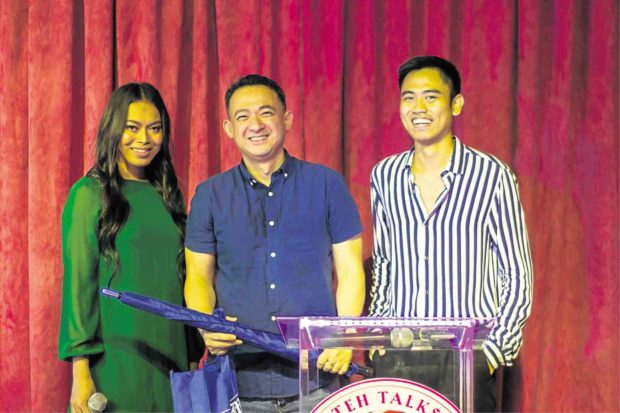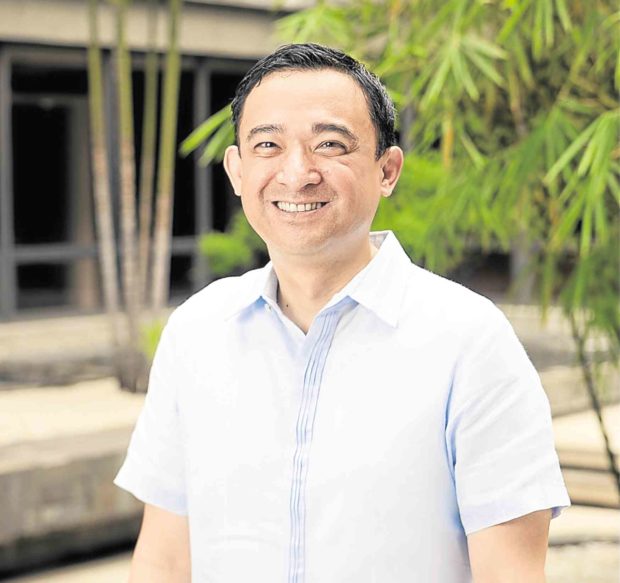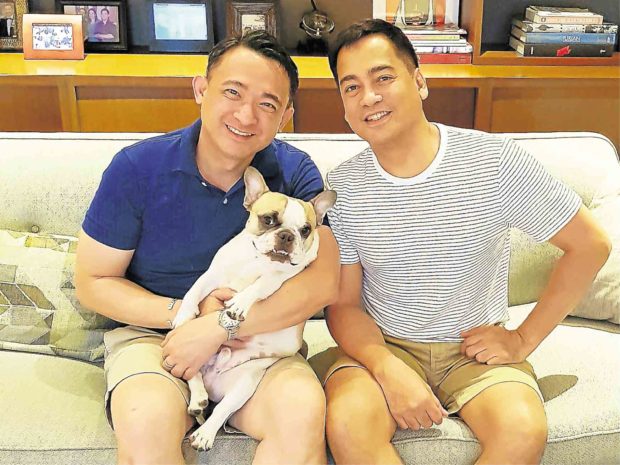Out and proud
I am Randy Estrellado, the chief operating officer of Maynilad Water Services Inc., the largest water service provider in the country, and an out and proud gay man.
Just five years ago, I wouldn’t have been able to say those words because [one] I wasn’t COO yet, and [two] I was not openly gay.
That I am able to say these words today, in a crowd like this, which includes Keith, my partner of 11 years this November, close friends, strangers, and even my niece (who promised she would stay in the back so I wouldn’t get conscious), and many more is beyond whatever dreams or fears I had at the start of my career in 1986, which was only 13 years after the American Psychiatric Association issued a resolution that homosexuality was a not a mental illness.
Think about that.
Forty-five years ago, being gay was tantamount to being mentally ill. I’m turning 53 this August, and while growing up I had no idea what the American Psychiatric Association was, I was certainly aware even at an early age that society did not consider being gay acceptable. Those of you who grew up in the 1990s at least had the fairly benign but no less stereotypical gay best friend to deal with. We didn’t even have that.
Article continues after this advertisementI can count with the fingers of one hand all the gay representation I saw growing up in the 1970s. Dolphy as Facifica Falayfay, German Moreno, Tony Santos Jr., Sandy “Atcheng” Garcia, and Soxie Topacio as Neneng in the sitcom Duplex. They were often verbally or physically abused— all for comic relief.
Article continues after this advertisementWorse were the gay characters I read about in the bestsellers like those written by Harold Robbins eagerly passed around by high school students because of the sex scenes in practically every chapter. I distinctly remember one in particular, Harold Robbins’ The Betsy, because it had a character who shot himself when it was discovered that he was gay, as many gay characters did in those potboilers.
I mention this not to say how lucky you are that you are here in the age of Glee, Modern Family, Grey’s Anatomy, Love Simon and Alex Strangelove but to provide context on how it must have been for corporate decision makers then dealing with homosexuality in the workplace.
Many of the CEOs and COOs of the largest companies in the Philippines today come from my generation, if not just a little bit older. Very few of them would have been exposed to gay men and women in gatherings like this. And to some of you who may have read about my story, and feel shocked or outraged about that HR executive who early in my career told me – “mag-asawa ka na para ma promote ka namin” (Get married so we can already promote you), to them that was the norm.
As I look back on that incident nearly 30 years later, I realize I am a little bit kinder to that HR executive than I may have been back then. He just didn’t know any better or perhaps was just parroting what he had been taught when he entered the workplace. There was certainly no precedent.
It was such a conservative company that Human Resources had a ruler with them at all times to ensure none of the women’s skirts were above a certain number of inches above knee. And none of its officers was single. And no one was openly gay.
Which is why even if I am not naturally comfortable being out there, I am here in front of you today, an out and proud gay man.
I am out there for the young men and women, boys and girls, so they may know that sexual orientation should not hinder anyone from pursuing his or her dreams.
I knew I was gay before I even hit puberty. I liked Donnie Osmond more than his sister Marie, and I was always slightly disappointed when the Hardy Boys/Nancy Drew Mysteries for the week featured Pamela Sue Martin instead of Shaun Cassidy and Parker Stevenson.
And there was a point in my life I actually thought that I would be a Paper Doll, this group of female impersonators that would guest every Sunday night on Seeing Stars with Joe Quirino.
Fortunately or unfortunately, I did not have the talent for it, but growing up that’s how starved I was for identification. I clung to anything and everything I could find that would speak to me as a gay person.
I am out there also for the straight men and women I work with, because for most people, until they actually get to know another person of a different race, religion, gender or sexual orientation, then these remain abstract ideas, or worse, discriminatory generalizations.
Why did the HR executive prefer me to be married? On the one hand, perhaps he thought a married person would be more responsible because he had a family to take care of and would not be a flight risk because that person would not want to put his family in jeopardy.
On the other hand, maybe the old stereotype about gay men played in his head—the weak man who is vulnerable to the risk of being blackmailed or could not be trusted with money because he needs it to buy love. If they do not know us, how would we ever erase the prejudice?
And I am also out for people like me—gay people who are already managers, junior executives, and even senior executives of their corporations.
I was reading recently about the impostor syndrome—successful men and women who feel an internal sense of being a phony or fraud in their industry despite undeniable credibility, authority, or accomplishment. This is something that happens to almost everyone at some point in their lives but recent studies show it is more common for minorities because the lack of representation can make them feel like outsiders.
Last year, I was a speaker at Philippine Financial Industry Pride and meeting LGBT executives in the financial and business process outsourcing industry certainly felt reassuring. Unfortunately, all the members were from multinational corporations whose home countries promote diversity and inclusion. And they said they could not get a single local company to join their group.

Estrellado (middle) with Naomi Fontanos of GANDA Filipinas and Phil dela Torre of Team Magazine who organized the event. — CK Saavedra
Interestingly, none of these reasons was the primary one that drove me to come out in the news magazine of our group of companies four years ago. First Pacific Leadership Academy wanted to do a cover story on me in their official publication that typically profiles the leading executives of the group. The feature would normally be six pages long highlighting the executive’s careers, interviewing their colleagues and friends, and usually devotes around two pages to the executive’s family.
It took me a while to say yes to the feature because I didn’t know how it would treat my personal life and how I wanted it to be treated. And then I saw the list of questions they wanted to ask and I noticed they were giving me an out.
I was then Chief Finance Officer and was going to be the first CFO to be featured so they wanted Finance to be the main focus. I didn’t have to talk about my family if I didn’t want to.
But then I thought of every other executive they had featured and I thought doing the interview without sharing my personal life and, more importantly, revealing the love of my life who at that time I had been with for over seven years would not only be dishonest but also unfair to him and to our relationship.
And so I requested if I could be the one to write about it. I also eventually shared the story on Facebook and the rest as they say is history.
I have said that that turned out to be one of the best decisions I have made in my life. None of my fears came about and was awed by the love and affection expressed to me by people, some of whom were the last ones I expected to do so. What I didn’t realize when I came out, is how I believe it has made me a better leader, certainly a more authentic one.
Those of you here who work in large corporations know that one of the more important skills to learn as one moves up an organization is how to compartmentalize. We divide our days into hours of meetings and conference calls, we take on specific roles in committees, and we leave them there as we move on to the next one, otherwise we would not be able to function. We are angry one hour, cheerful the next, complaining then encouraging. We compartmentalize and it makes us more efficient in our functions. Walang personalan, trabaho lang (nothing personal, it’s just work).
But as we go up the organization, and we begin to lead more than our respective sections, or departments, or divisions, I believe another skill rises in importance—integration instead of compartmentalization. It becomes more important to always see the whole and not just the parts or even the sum of it.
We have to see how everything integrates with each other, including how we integrate the personal with the professional. If management is walang personalan, trabaho lang—I believe that leadership is always personal.
I truly believe I would not be as effective a leader if I had kept hidden an integral and fundamental part of my being.
As leaders, we often ask our people to give of themselves and I would like them to know what’s at stake for me too.
In coming out, I have shared myself, my family, my values and everything I hold dear.
Let me end by wishing everyone here a Happy Pride.
Let’s celebrate love, diversity, acceptance and unashamed self-pride. —CONTRIBUTED

